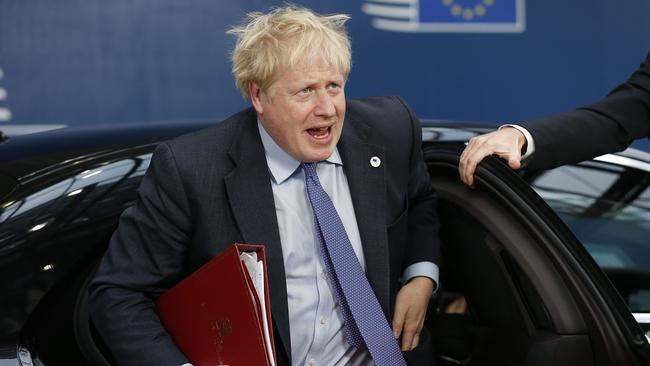Brexit vote going down to the wire
Boris Johnson’s charm offensive is working but the House of Commons’ Brexit vote appears too close to call.

British Prime Minister Boris Johnson’s charm offensive to get Brexit done in Saturday’s momentous vote in the House of Commons appears to have won over several Labour rebels but the result is too close to call.
By the end of Saturday, Britain could face even messier and destructive challenges if the vote fails to support leaving the EU with the freshly negotiated deal.
MPs begin their debate on Saturday evening (AEDT) amid a febrile atmosphere and an increasingly angry public.
At best, if the deal the Prime Minister struck with EU leaders squeaks across the line in the Commons, it would deliver the minority Johnson government only its second parliamentary victory in the nine votes of its existence.
But the Democratic Unionist Party has been campaigning that the deal drives a coach and horses through the 1998 Good Friday Agreement and Labour has been whipping its MPs to oppose it.
The parliamentary number that Mr Johnson requires is 320 votes, but yesterday he was facing a victory by five or a loss by 55, depending on how various factions voted.
MPs were ignoring the pitch from both European Commission president Jean-Claude Juncker that the Brexit deadline of October 31 would not be prolonged, and Mr Johnson’s insistence the vote was a strict choice between leaving with a deal or without a deal.
European Council president Donald Tusk — appointed by the political leaders who have the power to extend the deadline — was non-committal.
Remainers are determined to make Mr Johnson ask for an extension beyond October 31 if the vote fails, to avoid leaving without any deal at all.
The most optimistic scenario for Mr Johnson is if nearly all his Conservative party MPs — at least 280 of the 287 — vote for the deal. About 18 of the 21 Tories reinstated to the party after crossing the floor to secure the Benn Act, which prevents a no-deal Brexit, are also likely to support the deal.
If most of the independent MPs — some of them former Tories — back it, then Mr Johnson just needs a handful of Labour rebels.
In frenzied lobbying involving personal telephone calls and meetings, Mr Johnson has wooed some Labour MPs in pro-Brexit seats with promises to protect workers’ rights and environmental standards enshrined by the EU.
Downing Street is trying to convince the Democratic Unionist Party that the border down the Irish Sea and consent concerns to extricate Northern Ireland from EU rules would be a technical issue only. It argues that under the new deal, Northern Ireland would benefit from free-trade agreements that Britain would be able to strike.
The DUP, which has 10 votes, was lobbying for MPs to reject the deal as a way to protect the Union.
Mr Johnson’s polling figures, which show he could win an election with an outright majority, are also working against him.
The opposition fears a general election and wants to be the puppeteers of the Brexit process, forcing Mr Johnson to carry out actions to which he is opposed.
Belfast DUP MP Sammy Wilson said: “I believe, with a big majority, he can be more robust in his negotiations.
“It is one of the reasons why we believe that voting this down is not the end of the game but in fact probably opens up possibilities for the government that are not available at present but will be after a general election.”
If the vote fails, Mr Johnson could call for a general election, a move that has failed twice before, requiring two-thirds of the parliament’s support. Scottish Nationalist Party MPs may support such an election vote, with SNP Westminster leader Ian Blackford saying “quit dithering, back our amendment, and finally act to bring this appalling Tory government down and stop Brexit”.
There are court actions in Scotland to enforce Mr Johnson to ask for a Brexit extension, and another launched on Thursday to rule whether the deal negotiated with the EU is illegal. Remainers say it breaches laws preventing different Customs rules across Britain.
Smaller opposition parties have been split about trying to amend Saturday’s vote to allow a confirmatory referendum on the deal or swing behind Labour’s plan to push for a second plebiscite.
Labour wants any second referendum to put cancelling Brexit up against the deal negotiated by former prime minister Theresa May, which was voted down three times.




To join the conversation, please log in. Don't have an account? Register
Join the conversation, you are commenting as Logout